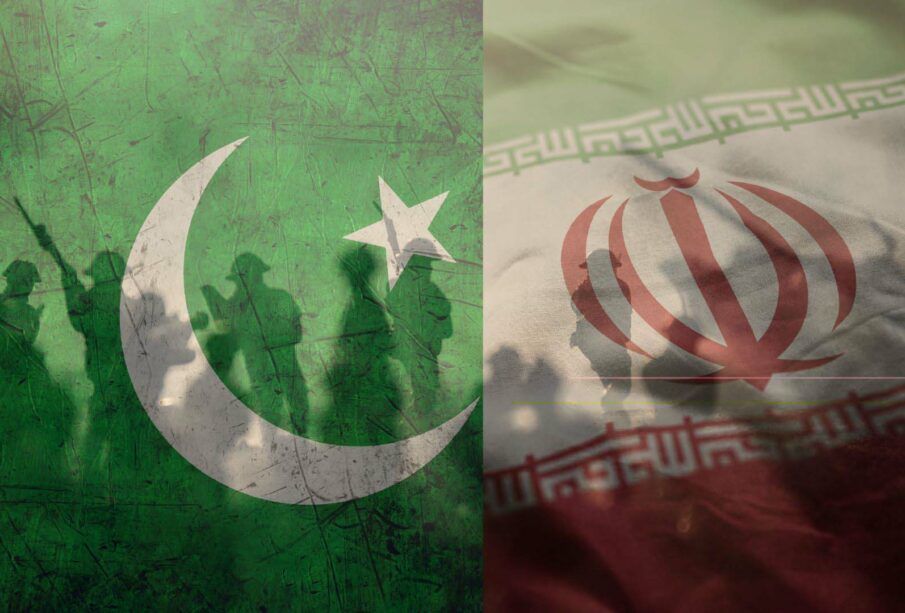Pakistan-Iran confrontation can lead to serious consequences

The ebb and flow situation in the Middle East gets tense. Many concerned that the conflict that broke out between Hamas and Israel could spread and embrace the whole region. First, the attacks of Houthis on ships in the Red Sea, and mutual missile strikes between Pakistan and Iran aggravated the concerns.
Several days ago Iran fired missiles to the North of Iraq and Syria and claimed that it targeted ISIS and Mossad bases and headquarters in the region. Neither Syria nor Iraq retaliated against Iran. Baghdad was limited to sharing a statement condemning the strikes. Late on the same day, Tehran announced that it launched missiles at Pakistan aiming at terrorist groups. First Pakistan condemned the attacks and recalled its ambassador from Tehran. After several hours, it was announced that Pakistan retaliated against Iran and hit some targets in Iran.
Speaking to AZERNEWS CEO, Belt and Road Consultant Pvt Limited Muhammad Asif Noor noted that Iran is also motivated to show its muscle to reflect its strategic upper hand however as a result of Pakistan’s strike back in response was considered as a watershed moment to balance the threat perception that might be caused in these circumstances. Iran is playing proxy in the ongoing crisis in the Middle East and continue doing it and through its various groups is trying to make Israel bleed.
“Although despite having regular connections and open channel of communications, this strike was conducted in Pakistan is not shocking as it has its roots linked with the detailed blasts and aftermath of it. Even when the strike was conducted both countries were having scheduled high level meeting in Davos on the sidelines of the World Economic Forum. Pakistan has also suspended its diplomatic ties with Iran and recalled its Ambassador back to home and asked the Iranian Ambassador to stay back home. This may spill in the other regions as well if this might not be de-escalated it immediately,” Asif Noor said.
He noted that China has offered to mediate between the two as a country that has recently while globally there are call for restrain. Even the Iraq’s Minister said in response to the Iran’s attack on Iraq that, the Iranians don’t want to or cannot attack Israel. They search for victims around them, and so they attack Erbil, adding that Iraqis are “paying the price” for Iran’s tensions with Israel.
“In my opinion the war between Israel and Hamas has already entered a broader spectrum especially in the Middle Eastern region especially with the involvement of Hezbollah and the Yemni Houthis continuous attacks in the Red Sea and the Arabian Sea. Israel is countering the Hezbollah along the Lebanese border whereas the Western states more specifically the US and UK are bombing Yemen to retaliate against Houthis. In most recent development US has declared Houthis as a terrorist organization and says could reverse its decision if Houthis stops their blockade of the sea routes towards Israel. Iran would choose an indirect approach to deter the western and Israeli powers more specifically by sponsoring Hezbollah and Hamas and would not want to come at forefront of this matter,” Asif Noor said.
He noted that currently, Iran and Pakistan can afford a conflict due to escalating tensions. Both nations have similarly targeted terrorist groups operating within their borders, with Iran attacking Jaish al Adl and Pakistan targeting the Sarmachar group. Pakistan's response was deemed necessary to uphold its credibility and military strength, amidst domestic and international scrutiny over its status as a nuclear power.
“It's anticipated that tensions will de-escalate, as neither Iran nor Pakistan desires a full-scale war. Both are facing significant challenges: Iran is grappling with sanctions, while Pakistan seeks political stability and economic recovery, aiming to attract foreign investment. The recent communication between Iran's and Pakistan's Foreign Ministers suggests a mutual reluctance to engage in war. Pakistan's retaliatory strikes against Iranian targets, reportedly terrorist camps in ungoverned areas of Iran, were a measured act of deterrence,” the Pundit said.
He added that Iran's concerns are noted, but such actions do not justify breaching Pakistan's sovereignty. This incident put Pakistan in a delicate position, as it faced questions about its national security and credibility, both from its citizens and the international community. The expectation for Pakistan to respond was high, given the internal and external pressures to uphold its national integrity. In the broader regional context, the prospect of a full-scale war is seen as highly unlikely, largely due to the critical interests of major stakeholders like China.
“China, with its significant investments and strategic interests in the region, particularly favors stability and would likely oppose any form of large-scale conflict. This sentiment is shared by both Pakistan and Iran, who are aware of the catastrophic consequences a war would bring, not just to each other but to the wider region. Conflict could disrupt these, leading to increased prices and supply shortages worldwide. Existing and potential future foreign investment could be deterred, severely impacting projects crucial for economic development, such as the China-Pakistan Economic Corridor (CPEC).
The region is a crucial corridor for global oil and trade routes. Aiming to attract foreign investment and support from international financial institutions like the IMF, both nations understand the grave implications of war. The mere tension between Pakistan and Iran has already shown its impact, with a significant drop in Pakistan's stock market, underlining the fragility of the economic confidence in the region,” expert Asif Noor said.
---
Qabil Ashirov is AzerNews’ staff journalist, follow him on Twitter: @g_Ashirov
Follow us on Twitter @AzerNewsAz
Here we are to serve you with news right now. It does not cost much, but worth your attention.
Choose to support open, independent, quality journalism and subscribe on a monthly basis.
By subscribing to our online newspaper, you can have full digital access to all news, analysis, and much more.
You can also follow AzerNEWS on Twitter @AzerNewsAz or Facebook @AzerNewsNewspaper
Thank you!

